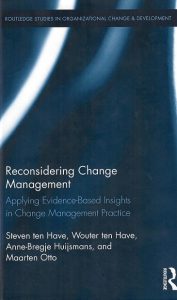What an important book! As I have stated in a previous blog (I love evidence-based management research!) I am a big fan of evidence-based management research which is defined as “the systematic application of the best available evidence to the evaluation of managerial strategies.” Therefore I try to adhere as much as possible to the principles of evidence-based management in my own HPO research. The brothers Ten Have have been proponents of evidence-based management research for a long time. They also often agitate against researchers, especially of the consultant type, that come up with ‘miracle cures’ that have no solid scientific foundation. According to them, these consultants suffer from ‘availability bias’ as they place relatively simple and intuitive attractive management concepts above less accessible scientific knowledge, and sometimes even promote views that are at odds with available academic evidence. They can do this as studies indicate that even highly educated and experienced managers are unaware of research findings that are relevant to their organizations. It goes without saying that all this is harmful to organizations that hire these ‘advisors.’
studies indicate that even highly educated and experienced managers are unaware of research findings that are relevant to their organizations. It goes without saying that all this is harmful to organizations that hire these ‘advisors.’
Reconsidering Change Management
In the book Reconsidering Change Management the brothers Ten Have, together with several colleagues, decided to investigate the scientific foundation of 18 popular change management theories. As the topic of change management has received considerable attention these past decades and as many theories are doing the rounds this effort is very welcome. In the book the authors describe these 18 theories in great detail and also how they investigated the academic foundation of these theories. They used the ‘rapid evidence assessment’ technique which comes down to a systematic review of the literature available on a specific theory, assessing this literature on its validity (i.e. how rigorous were the research methods used), and then ranking the theory by the strength of the available academic evidence. In the table below I have collected the findings of their investigation. There are three categories: the theory is substantiated, i.e. there was enough strong academic evidence for the theory; the theory is unsubstantiated, i.e. there was not or hardly any evidence which in addition might have been of questionable quality; and the findings about the theory are inconclusive, i.e. there is some evidence but often the ‘proof’ depended on the context in which the effects of the theory were measured.
| Theory | Finding |
| Seventy percent of all change initiatives fail. | Unsubstantiated |
| A clear vision is essential for successful change. | Substantiated |
| People will not change if there is no sense of urgency. | Unsubstantiated |
| Trust in the leader is needed for successful change. | Substantiated |
| When managing change, a transformational leadership style is more effective than a transactional one. | Unsubstantiated |
| Organizational change requires leaders with strong emotional intelligence. | Unsubstantiated |
| Supervisory support is critical for the success of the change. | Substantiated |
| To realize change in organizations, a powerful guiding coalition is needed. | Inconclusive |
| Employees’ capabilities to change determine the organization’s capacity to change. | Inconclusive |
| Participation is key to successful change. | Unsubstantiated |
| Resistance to change is detrimental to the success of change. | Inconclusive |
| A fair change process is important in achieving successful change. | Substantiated |
| Changing organizational culture is time-consuming and difficult. | Inconclusive |
| Organizational culture is related to performance. | Inconclusive |
| Goal setting combined with feedback is a powerful tool for change leaders. | Substantiated |
| Commitment to change is an essential component of a successful change initiative. | Inconclusive |
| Financial incentives are effective ways to encourage change and improve performance. | Unsubstantiated |
| Self-managing teams perform better in realizing change than traditionally managed teams. | Inconclusive |
The results listed in the Table are rather sobering. The authors found academic proof for only five of the 18 investigated change management techniques, while seven techniques were actually unsubstantiated by scientific research. Mind you, these techniques are still peddled by consultants and organizations actually pay good money for these, basically for something that does not work. From the remaining six techniques the evidence is as of yet inconclusive and need more evaluation in the future. If this book shows one thing it is that a critical review of the organizational improvement techniques proposed and marketed in the professional literature is sorely needed. After all, it is a fair assumption that more professional fields than only change management will suffer from the same ills.
In retrospect one can say: what a marvelous idea, why didn’t anybody think of this before? Well, these authors did and that makes their research and book an example for all us academics. The method used by the authors is a great way to review more improvement techniques, such as the abundance of frameworks and models to create high performance organizations (including my own framework). In this way, the academic community can offer managers information about what works and what doesn’t which will be very welcome to them and increases the value of academia for managerial practice. At the same time it will develop a healthy skeptical attitude in managers so they will not fall for the next consultant with a nice power point presentation. “Bring me first the proof!”, will be from now on a widely used exclamation in boardrooms!
More information in English:
Steven ten Have, Wouter ten Have, Anne-Bregje Huijsmans, Maarten Otto (2017), Reconsidering Change Management, applying evidence-based insights in change management practice, Routledge, New York
More information in Dutch:
Steven ten Have, Maarten Otto, Cornell Vernooij, Wouter ten Have (2017), Beter veranderen door het kennen en toepassen van evidence, Holland Management Review, no. 172, pp. 55- 62


